De Franse schrijver Érik Orsenna werd geboren in Parijs op 22 maart 1947 als Érik Arnoult. Zie ook alle tags voor Erik Orsenna op dit blog.
Uit: La grammaire est une chanson douce
“Les mots dormaient.
Ils s’étaient posés sur les branches des arbres et ne bougeaient plus. Nous marchions doucement sur le sable pour ne pas les réveiller. Bêtement, je tendais l’oreille : j’aurais tant voulu surprendre leurs rêves. J’aimerais tellement savoir ce qui se passe dans la tête des mots. Bien sûr, je n’entendais rien. Rien que le grondement sourd du ressac, là-bas, derrière la colline. Et un vent léger. Peut-être seulement le souffle de la planète Terre avançant dans la nuit.
Nous approchions d’un bâtiment qu’éclairait mal une croix rouge tremblotante.
-Voici l’hôpital, murmura Monsieur Henri.
Je frissonnai.
L’hôpital ? Un hôpital pour les mots ? Je n’arrivais pas à y croire. La honte m’envahit.
Quelque chose me disait que, leurs souffrances nous en étions, nous les humains, responsables. Vous savez, comme ces Indiens d’Amérique morts de maladies apportées par les conquérants européens.
Il n’y a pas d’accueil ni d’infirmiers dans un hôpital de mots ; Les couloirs étaient vides. Seule nous guidaient les lueurs bleues des veilleuses. Malgré nos précautions, nos semelles couinaient sur le sol.
Comme en réponse, un bruit très faible se fit entendre. Par deux fois. Un gémissement très doux. Il passait sous l’une des portes, telle une lettre qu’on glisse discrètement, pour ne pas déranger.”
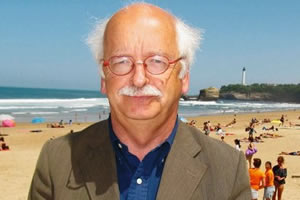
Érik Orsenna (Parijs, 22 maart 1947)
De Canadese schrijfster Gabrielle Roy werd geboren op 22 maart 1909 in Saint Boniface, Manitoba. Zie ook alle tags voor Gabrielle Roy op dit blog.
Uit: Street of Riches
My mother would retort: “Only yesterday the Fathers told me again that my Gervais is so intelligent everything comes to him effortlessly; and apparently that’s not too good a thing, either.”
My mother was most skillful in parrying what she called Madame Guilbert’s “thrusts.” Despite all this — or perhaps because of it — our two families could scarcely get along without each other.
Often of an evening my mother would go out on the open porch in front of our big house and say to my sister Odette, “Supper is ready. Run over and tell your father; he’s still at the Guilberts’. Bring him back before any argument begins.”
Odette would sally forth across the field. When she reached the Guilberts’, there my father would be, his pipe clamped between his teeth, leaning against our neighbor’s gate and chatting peaceably with Monsieur Guilbert about rosebushes, apple trees, and asparagus. So long as the two men were on such subjects, there was no need for alarm; and here Monsieur Guilbert was willing enough to accept my father’s views, since he granted that my father knew more about gardening than he did. Then Odette would espy Gisèle’s face at one of the upstairs windows. Gisèle would call out, “Wait for me, Odette; I’m coming down. I want to show you my tatting.”
In those days they were both fanatically devoted to piano playing and to a sort of lacemaking that involved the use of a shuttle and was, if my memory serves me well, called tatting.
Then my mother would send my brother Gervais to see what on earth could be keeping my Father and Odette over there. At the field’s edge, Gervais would encounter his classmate Lucien Guilbert, and the latter would entice my brother behind an ancient barn to smoke a cigarette; needless to say, Madame Guilbert always maintained that it was Gervais who had induced Lucien to indulge this bad habit.”
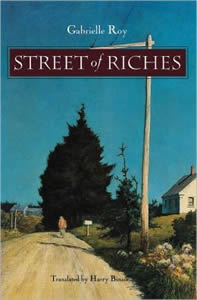
Gabrielle Roy (22 maart 1909 – 13 juli 1983)
Cover
De Tsjechische dichter en schrijver Ludvík Kundera werd geboren op 22 maart 1920 in Brünn. Zie ook alle tags voor Ludvik Kundera op dit blog.
Uit: Of Tea and Dada
“Kunstat nestles in a fold of undulating countryside that marks theeastern edge of the Bohemian-Moravian Uplands. Overlooking its broadmain street, stands the old house where Ludvik Kundera has lived forover a quarter of a century. Entering the house soon draws the visitorinto a world of tea-infusions and dada, two life-long Kundera passionsrecently marked by published volumes on the subjects. Conversation tooin all likelihood turns eventually to Frantisek Halas, whom Kunderafirst met in Kunstat and who lies buried in the nearby cemetery. But,equally, Kundera’s readiness to talk of past associations with HansArp, Alfred Kubin, Bertolt Brecht, Peter Huchel and others tells of anearly desire for involvement on the wider front of european culturaldevelopment in the twentieth century. In his youth, Kundera’s ownstudies were perforce terminated with the closing of Czech universitiesfollowing the German Occupation. Born in the spring of 1920 in Brno, hewas in his third semester. But an interest in literature and thetheatre was already aroused and his first verse appeared in Mladdkultura before the war. He had also embarked upon what was to be alife-long affaire de coeur with the art of translation – his firstventure, a schoolboy attempt to produce a Czech version of poems fromHeine’s Buch der Lieder. Both Czech and German were spoken in the home(his father was Czech, his mother half-Austrian, half-Hungarian) andthe house was well stocked with books. The beginnings of linguistic andcultural interaction were in place.”
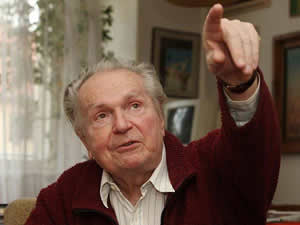
Ludvík Kundera (22 maart 1920 – 17 augustus 2010)
De Franse dichter Léon Deubel werd geboren op 22 maart 1879 in Belfort. Zie ook alle tags voor Léon Deubel op dit blog.
Tombeau du Poète
Par les sentiers abrupts où les fauves s’engagent,
Sur un pic ébloui qui monte en geyser d’or,
Compagnon fabuleux de l’aigle et du condor,
Le Poète nourrit sa tristesse sauvage.
xml:namespace prefix = v ns = “urn:schemas-microsoft-com:vml” />
À ses pieds, confondus dans un double servage,
Multipliant sans cesse un formidable effort,
Les Hommes, par instants, diffamaient son essor ;
Mais lui voyait au loin s’allumer des rivages.
Et nativement sourd à l’injure démente,
Assuré de savoir à quelle ivre Bacchante
Sera livrée un jour sa dépouille meurtrie ;
Laissant la foule aux liens d’un opaque sommeil,
Pour découvrir enfin l’azur de sa patrie
Il reprit le chemin blasphémé du soleil !
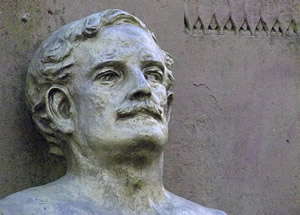
Léon Deubel (22 maart 1879 – 4 juni 1913)
Beeld in Belfort
De Engelse schrijver Edward Moore werd geboren in Abingdon, Berkshire op 22 maart 1712. Zie ook alle tags voor Edward Moore op dit blog.
Uit: The Gamester
“SCENE III.
Enter Jarvis.
Mrs. Bev. Is this well, Jarvis? I desired you to avoid me.
Jar. Did you, madam? I am an old man, and had forgot. Perhaps too you forbad my tears; but I am old, madam, and age will be forgetful.
Mrs. Bev. The faithful creature! how he moves me!
[To Charlotte.
Char. Not to have seen him had been cruelty.
Jar. I have forgot these apartments too. I remember none such in my young master’s house; and yet I have lived in’t these five and twenty years. His good father would not have dismissed me.
Mrs. Bev. He had no reason, Jarvis.
Jar. I was faithful to him while he lived, and when he 425Iii died, he bequeathed me to his son. I have been faithful to Him too.
Mrs. Bev. I know it, I know it, Jarvis.
Char. We both know it.
Jar. I am an old man, madam, and have not a long time to live. I asked but to have died with him, and he dismissed me.
Mrs. Bev. Prithee no more of this! ‘Twas his poverty that dismissed you.
Jar. Is he indeed so poor then? Oh! he was the joy of my old heart. But must his creditors have all? And have they sold his house too? His father built it when He was but a prating boy. The times I have carried him in these arms! And, Jarvis, says he, when a beggar has asked charity of me, why should people be poor? You shan’t be poor, Jarvis; if I was a king, nobody should be poor. Yet He is poor. And then he was so brave!—O, he was a brave little boy! And yet so merciful, he’d not have killed the gnat that stung him.”
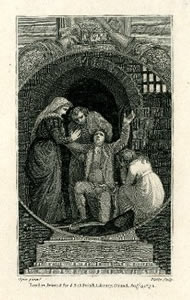
Edward Moore (22 maart 1712 – 1 maart 1757)
Illustratie uit een uitgave uit 1792
De Vlaamse dichter en schrijver Arnold Sauwen werd geboren te Stokkem op 22 maart 1857. Zie ook alle tags voor Arnold Sauwen op dit blog.
In blauwe lucht, hoog boven heuvelklingen
In blauwe lucht, hoog boven heuvelklingen
en open veld, dat laait in zonnegloed;
met scherpe blikken, die ter laagte dringen,
zwerft daar de sperwer rond, die dorst naar bloed.
Hij daalt en stijgt en zweeft in wijde kringen,
tot ’t speurend oog de bange prooi ontmoet;
hangt dan een poos te trillen op zijn zwingen
en schiet plots neêr… Wee! argeloos gebroed…
Een noodkreet gilt… de witte veêren stuiven,
daar kromme snavel ’t rillend vleesch doorwoelt;
maar machtloos vleugelklept de angstige duive,
gelijk de ziel die lust schept in het leven,
maar boven zich de hand des Noodlots voelt,
als sperwerklauwen dreigend opgeheven!’
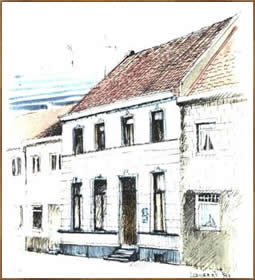
Arnold Sauwen (22 maart 1857 – 11 mei 1938)
Geboortehuis in Stokkem
Zie voor nog meer schrijvers van de 22e maart ook mijn blog van 22 maart 2012 deel 2.
